Here we explain how the Frensh hub Atelier Paysan, produces values, knowledge, togetherness, machinery and convivial tools.
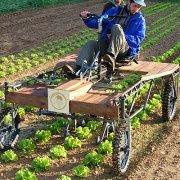
The Aggrozouk. source ![]()
Our activities aim to transform people’s relationship with machinery. Metalwork is an integral part of farming. We want to move away from a farming system where the breadth of skills involved in farming has been lost and farmers become merely extractors of primary materials. We want to see every farmer able to design, build and modify his/her machinery and equipment.
# Atelier Paysan about their Tools
We are adapting tools to the context in which they are used.
[@TO DO SILKE: CONSTRAST THESE STATEMENTS With description of Convivial Tools according to Vetter)
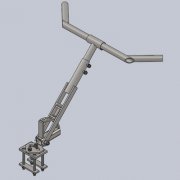
Adjustable Handlebar/. source ![]()
1. All agricultural tools produced are considered unfinished "not aimed to be perfect or definitive products. ...farmers need to assess how they can be best used and adapted on their own holdings. With the training they have received, farmers can go back to their farms and modify their tools, adapting them to suit the context."
Use the handfork! With soil cultivation tools, because the result of your work is buried several centimetres in the soil, it isn’t visible to the naked eye so it’s essential to get out a hand fork and see the impact the tool has had on the soil. (Joseph Templier, joint manager of Atelier Paysan and former vegetable grower)
2. All codesigned tools and machines need to be used with respect to the specific on farm conditions and responsibly. Atelier Paysan coordinators therefore suggest simple things like "Before you pass with your cultivation tool, ... use the hand fork to see how deep you want to cultivate and adjust the depth on your machinery accordingly." Same principle applies after cultivation to check you’ve got the result you want.
3. Atelier Paysan tools help gaining confidence and autonomy, adapting and sharing technologies Farmers will be way better prepared toengage in discussion on appropriate farm machinery.
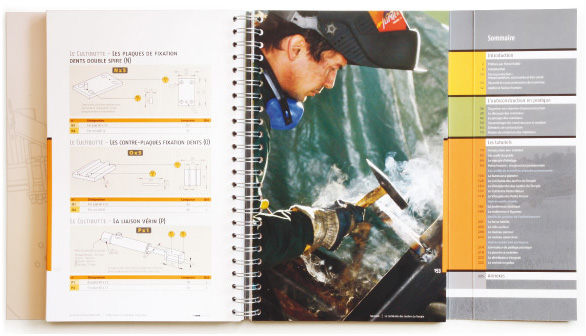
The Self-Build Guide source ![]()
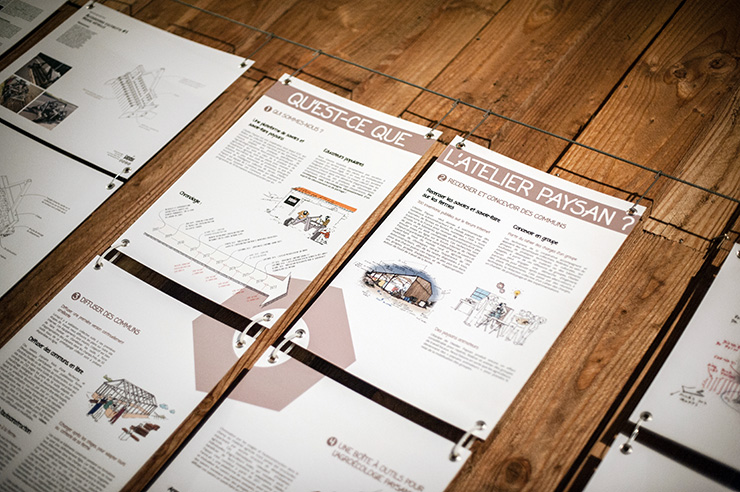
Transported image.
source ![]()
# How does Provisioning through commons occur?
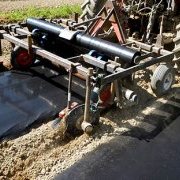
The Plastic Rolling Machine. source ![]()
Atelier Paysan co-produces with groups of small scale farmers agricultural tools and buildings tailored to their needs in whatever area of production. - 1. The tools we develop are not finished products The tools developed by Atelier Paysan are not aimed to be perfect or definitive products. Even though the tools have been collectively designed, farmers need to assess how they can be best used and adapted on their own holdings. With the training they have received, farmers can go back to their farms and modify their tools, adapting them to suit the context in which they are used. 2. Promoting critical and responsible use of farm machinery Joseph Templier, joint manager of Atelier Paysan and former vegetable grower: “Visiting farms, we’ve seen to what extent vegetable growers are failing to make use of a wonderful tool: the hand fork. Machinery developed for permanent beds are great tools, but all tools can do a terrible or fantastic job depending on the way they are used. With soil cultivation tools, because the result of your work is buried several centimetres in the soil, it isn’t visible to the naked eye so it’s essential to get out a hand fork and see the impact the tool has had on the soil. Before you pass with your cultivation tool, it’s also important to use the hand fork to see how deep you want to cultivate and adjust the depth on your machinery accordingly. Same principle applies once you have cultivated, to check you’ve got the result you want. These checks carried out with the hand fork are especially important for new farmers who are learning how to work with their soil. Every soil gives rise to a particular situation, and one-fits-all solutions are rare. It’s down to each farmer to learn how best to work with his/her soil and tools. It’s a process of trial and error!” 3. Gaining confidence and autonomy, adapting and sharing technologies We have witnessed how the development of farmer-driven technologies and workshops allow farmers to gain skills and confidence, and engage in discussion on appropriate farm machinery. Both these skills and discussions can help farmers to find the solutions that are best suited to their particular needs.
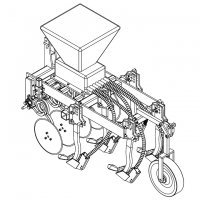
Green Manure Seed Drill for Vineyards. source ![]()
Atelier Paysan's training courses accross France take 3 to 5 days. During the courses agricultural tools are created in the workshop which are either non-existent on the marketplace, too costly or not adapted to small-scale organic farming. As well as building a tool, farmers gain in autonomy as they learn metal work. A farmer who has built rather than bought his/her tool is better placed to repair or adapt it in future.
- Pool & Share You are free to use our technical drawings to create your own piece of equipment at home, modifying it as you see fit. We really appreciate feedback, as this can contribute to improving our designs. The end goal of our work is to have tools and machines that evolve, as a tool or machine which has been adapted can go on to benefit the wider community.
YOUTUBE lysABKBWBKI rouleau fakir (2017)
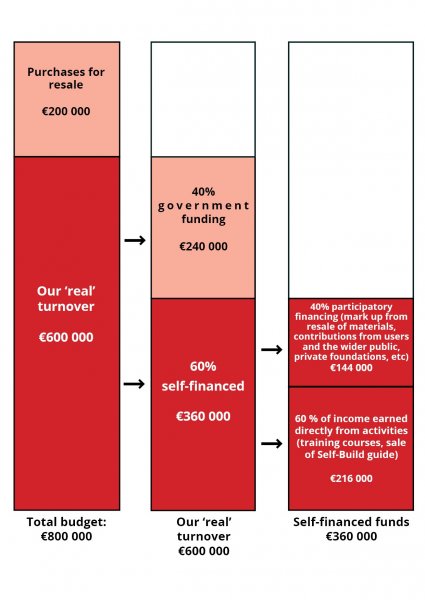
Economic Model.
source ![]()
A socio-economic model for collaborative and open innovation Atelier Paysan’s model of innovation is based on the involvement of its users. The cooperative’s overall direction also answers to its beneficiaries. This ensures that the tools designed and disseminated are relevant and useful to users. This collaborative form of research and development does not require huge costs. Working under Creative Commons licensing, users can share their ideas without the risk of any appropriation or restriction of access. This communal culture encourages users to share their adaptations and contribute to a virtuous cycle of innovation: a design published under Creative Commons can be continually modified and improved by its users. This ecosystem of innovation also contributes towards the exploration of resilient economic models.
# See also Atelier Paysan, Atelier Paysan Financing